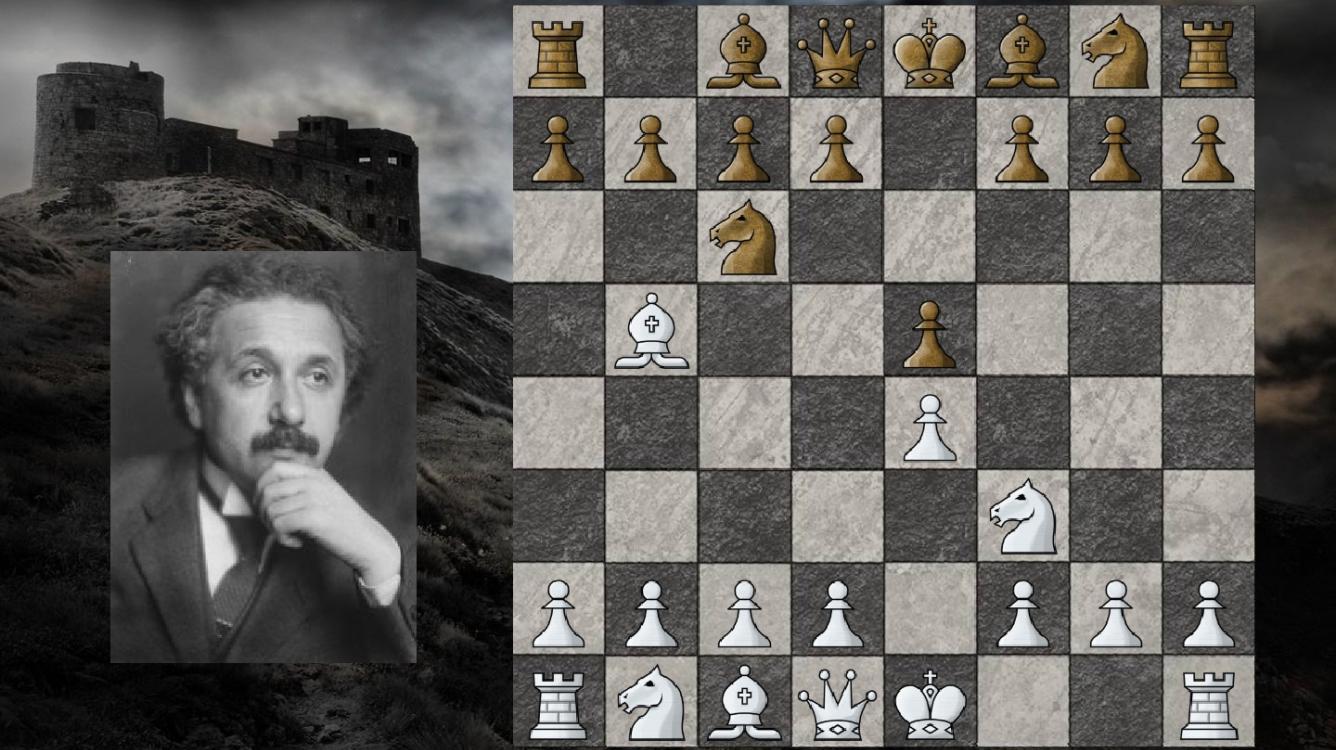
Albert Einstein Plays the Ruy Lopez Opening
 Albert Einstein, (March 14, 1879 - April 18, 1955), was a theoretical physicist who is widely regarded as the greatest scientist of the 20th century. He proposed the Theory of Relativity, which greatly advanced humankind's understanding of the universe. He also made major contributions to the development of quantum mechanics, statistical mechanics, and cosmology. He was awarded the 1921 Nobel Prize for Physics for his explanation of the photoelectric effect.
Albert Einstein, (March 14, 1879 - April 18, 1955), was a theoretical physicist who is widely regarded as the greatest scientist of the 20th century. He proposed the Theory of Relativity, which greatly advanced humankind's understanding of the universe. He also made major contributions to the development of quantum mechanics, statistical mechanics, and cosmology. He was awarded the 1921 Nobel Prize for Physics for his explanation of the photoelectric effect.
Einstein had an interest in chess. In 1936, he told a reporter that he played chess as a boy. In 1927 Einstein met Emanuel Lasker in Berlin, and they became good friends. Einstein called Lasker "a Renaissance man."
 In 1931 a booklet was written called "One Hundred Authors Against Einstein." One of the authors was Emanuel Lasker. Lasker thought Einstein's theory of relativity was wrong and that the speed of light was limited due to particles in space. Lasker did not think there was a perfect vacuum.
In 1931 a booklet was written called "One Hundred Authors Against Einstein." One of the authors was Emanuel Lasker. Lasker thought Einstein's theory of relativity was wrong and that the speed of light was limited due to particles in space. Lasker did not think there was a perfect vacuum.
Einstein is quoted as saying: "Chess grips its exponent, shackling the mind and brain so that the inner freedom and independence of even the strongest character cannot remain unaffected."
Julius Robert Oppenheimer 
(April 22, 1904 – February 18, 1967) was an American theoretical physicist and professor of physics at the University of California, Berkeley. He is among the persons who are often called the "father of the atomic bomb" for their role in the Manhattan Project, the World War II project that developed the first nuclear weapons. The first atomic bomb was detonated on July 16, 1945, in the Trinity test in New Mexico.
 After the war he became a chief adviser to the newly created United States Atomic Energy Commission and used that position to lobby for international control of nuclear power to avert nuclear proliferation and an arms race with the Soviet Union.
After the war he became a chief adviser to the newly created United States Atomic Energy Commission and used that position to lobby for international control of nuclear power to avert nuclear proliferation and an arms race with the Soviet Union.
After provoking the ire of many politicians with his outspoken opinions during the Second Red Scare, he had his security clearance revoked in a much-publicized hearing in 1954, and was effectively stripped of his direct political influence; he continued to lecture, write and work in physics. Nine years later President John F. Kennedy awarded (and Lyndon B. Johnson presented) him with the Enrico Fermi Award as a gesture of political rehabilitation.

LBJ Presents Enrico Fermi Award
Oppenheimer's notable achievements in physics include the Born–Oppenheimer approximation for molecular wavefunctions, work on the theory of electrons and positrons, the Oppenheimer–Phillips process in nuclear fusion, and the first prediction of quantum tunneling. With his students he also made important contributions to the modern theory of neutron stars and black holes, as well as to quantum mechanics, quantum field theory, and the interactions of cosmic rays.
 Institute for Advanced Study
Institute for Advanced Study
As a teacher and promoter of science, he is remembered as a founding father of the American school of theoretical physics that gained world prominence in the 1930s. After World War II, he became director of the Institute for Advanced Study in Princeton.
The following is a game between Einstein and Oppenheimer, featuring the Ruy Lopez Opening: Morphy Defense, Caro Variation (C70).
